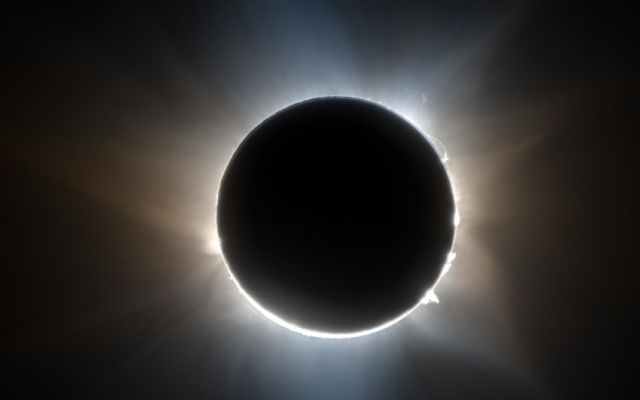
Hope for sun, expect fun and plan for safety during eclipse
By BDN Editorial Board
You’ve probably already heard that, next Monday, something big will happen in Maine for the first time in more than 60 years. The April 8 solar eclipse has gotten an astronomical amount of attention, and for good reason.
The path of totality, in which the moon will totally obscure the sun, will sweep through some of Maine from parts of Oxford to Aroostook counties. The rare celestial phenomenon will last more than three minutes in those parts of the state.
The planning, of course, has lasted much longer than that. Some Maine towns, especially Houlton, have long been planning and positioning themselves to welcome visitors.
In 1962, the Bangor Daily News editorial board encouraged readers to spread the word about a forthcoming solar eclipse in 1963 to make sure that visitors would in fact come to Maine. At the time, the board imagined that “relatively few people in the U.S. have heard about it yet or given it much thought.” Six decades later, and just a week before the next total eclipse, we imagine that most people in Maine have heard about the eclipse and, if they’re interested in seeing it, have put some thought into the planning.
That planning should include what happens if the weather doesn’t cooperate. As reporter Kathleen Phalen Tomaselli explained in the BDN in March, the sun and moon will be crossing paths in the sky regardless of the weather. Hopefully clouds will cooperate by staying away on Monday, but if not, the folks in Houlton will still be prepared with a high altitude balloon that will be above the clouds and livestreaming the eclipse. The BDN website also will carry the livestream.
“Rain will not affect the science. We will still get data and there are a variety of projects, exploring the way animals behave, some places are measuring temperature changes,” Shawn Laatsch, director of the Versant Power Astronomy Center in Orono, said in March.
“It’s a whole body experience and you only need three minutes [of good weather],” Laatsch said.
We’ll be hoping for those three minutes of good weather. And we’ll be hoping that eclipse viewers plan ahead to secure proper eye protection, and listen to expert advice about making sure those eclipse glasses are actually safe. As highlighted by BDN reporting from Valerie Royzman last week, people should be aware that some fake eclipse glasses are out there, and should take steps to test their glasses at home ahead of time. This can be done by putting on the glasses and looking at a shaded lamp rather than the sun itself.
“If you can see that light, your eclipse glasses aren’t strong enough,” according to the Planetary Society. “If you try this and can’t see the light, try looking at something brighter like a bare lightbulb. This should appear dim through a safe solar lens.”
Remember that while some towns have rolled out the red carpet, other areas are concerned about local infrastructure’s ability to support many visitors, particularly during another mud season. For instance, Baxter State Park officials have encouraged eclipse watchers to avoid the park, which is closed to most uses in April.
“If you come to the Katahdin region for the solar eclipse, please keep your tires on the paved road and your boots on the sidewalks of our communities,” Kevin Adam, the park director, wrote in a recent column in the BDN.
Have a plan, wear eclipse glasses (and make sure they’re safe ahead of time), stay out of Baxter State Park and off unfamiliar unpaved roads, pray for good weather, and consider the communities where the eclipse will be visible.
“We have one road in and one road out,” Jennifer Aucoin, president of Destination Moosehead Lake, told the BDN recently. “You can’t get here by multiple routes. So we’ll see how traffic goes. We hope everyone has a safe and memorable experience.”
Again, we hope so, too. The sun will disappear for a few minutes, but our manners shouldn’t. Respect the communities hosting eclipse events. Respect fellow eclipse watchers. Respect the power of the sun, and take the necessary steps to protect your eyes.
And above all, appreciate the rarity of this event and all the planning that has taken place to help people enjoy it here in Maine.